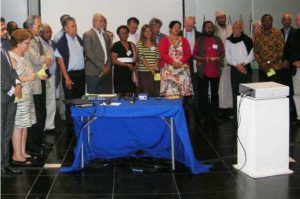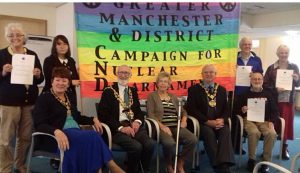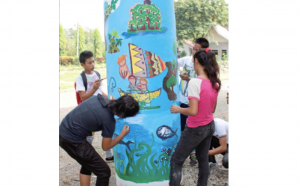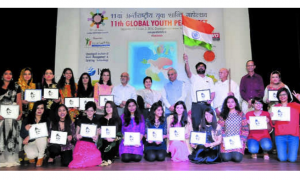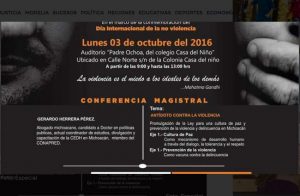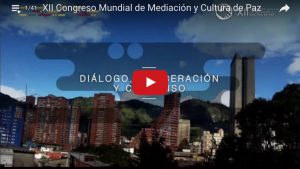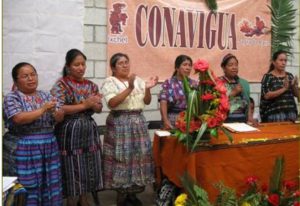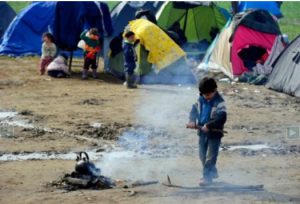.DISARMAMENT & SECURITY. .
An article from Ahram Online
The Women’s Boat to Gaza (WBG) mission is set to arrive in Gaza in a couple of hours and aims to challenge the 10-year blockade of the strip and highlight the critical role of Palestinian women in the resistance movement amid fears of Israeli forces intercepting the mission, according to WBG’s website.
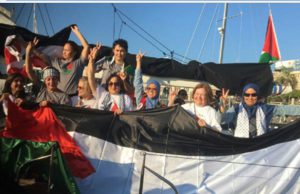
Sandra Barralilo, MP Jeannette Escarilla, Ann Wright, Ambassador , Dr. Fauziah, Mairead Maguire, MP Samira Douliafia. Above MP Marama Davidson. Olympic Athlete Leigh-Ann Naidoo. (Photo Courtesy of Women’s Boat to Gaza website)
Click on photo to enlarge
The Israeli naval and land blockade has severely restricted the movement of 1.8 million Palestinians and goods to and from Gaza since the Islamist Hamas movement became its de-facto ruler in 2006, inflicting increasing suffering on the impoverished population.
“At home we are all asking our governments to ensure the safe passage of Zaytouna [the Women’s Boat to Gaza]. We are calling on government leaders to stand with us in this challenge and to support our efforts to end this blockade, which is a collective punishment and is illegal under international law,” Wendy Goldsmith, an organiser of the Canadian Boat to Gaza campaign, told Ahram Online.
The women’s boat to Gaza, which includes only women from all over the world, is the fourth mission that has been organised by the Freedom Flotilla Coalition after the last attempt in 2015 ended with the seizure of the boat by Israeli forces in international waters.
“If Israel chooses to intercept this peaceful mission, they will be greeted by 13 incredibly strong and resilient women who are on a course to break the illegal blockade of Gaza. They will be met with love and determination to reach the conscience of humanity,” she said.
The two boats that make up the women’s boat mission — the Amal-Hope and Zaytouna-Oliva — have docked at a number of Mediterranean ports since 12 September, but the Amal-Hope broke off at Barcelona due to unexpected engine problems with only Zatouna-Olivia continuing the journey.
(Article continued in right column)
Presenting the Palestinian side of the Middle East, Is it important for a culture of peace?
(Article continued from left column)
“The women on the boat send us daily updates and they report that they are in fine spirits and are looking forward to reaching the shores of Gaza,” Goldsmith said, adding that “we are also in regular contact with the women in Gaza and West Bank who have been organising many solidarity events. We are deeply touched and encouraged by the spirit of sisterhood around the world.”
The first attempt to break the siege with a flotilla, which was organised in 2010, ended in the killing by Israel of nine activists in international waters on the Turkish ship Mavi Marmara.
A second attempt was organised out of Greece in 2011, but the vessels were turned back by the Greek coastguard.
Among the diverse group of women on board are Swedish Member of European Parliament Malin Björk; a retired American army colonel and former diplomat who resigned in 2003 in opposition to the invasion of Iraq, Ann Wright; Irish Nobel Laureate and peace activist Mairead Maguire; and Turkish athlete and coach Cigdem Topçuoglu, whose husband was killed in the Israeli attack on the first freedom flotilla in 2010.
“Within this struggle, men and women play equal roles. In this particular project, it has been decided that women will take on the major role of confronting the Israeli Occupation Force (IOF). This does not minimise in any way the role that men take in both the organising and planning stages,” according to the launching statement of WBG sent to Ahram Online in March.
The Freedom Flotilla Coalition is an international coalition composed of civil society organisations and initiatives from all over the world challenging “the illegal and inhumane” Israeli blockade of Gaza.
“When we arrive in Gaza we expect to be greeted by our many supporters, perhaps with coffee and falafel, music and dance. We hope to join hands with our sisters and claim an end to the blockade that has created the world’s largest open air prison, where innocent children and their families suffer every day,” Goldsmith said.
